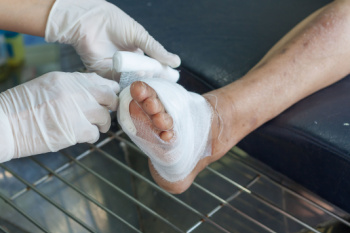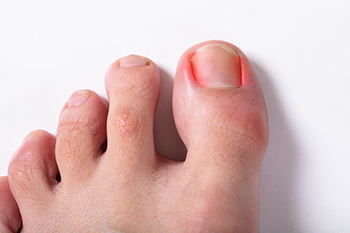
Diabetes can lead to a range of serious foot problems due to its impact on circulation and nerve function. One of the most common complications is neuropathy, which causes tingling, numbness, or pain and reduces the ability to feel injuries. Peripheral artery disease can further restrict blood flow, slowing healing, and increasing the risk of infection. Foot ulcers may develop from unnoticed cuts or pressure points and can become severe without prompt care. Diabetic blisters, although painless, can appear suddenly and may become infected if not treated properly. Additionally, edema, or swelling in the feet and ankles, is another frequent issue and may indicate worsening circulation. If you have diabetes, it is strongly suggested that you consult a podiatrist who can provide proper foot care and regular checkups, which are essential for managing diabetes and preventing long-term complications.
Diabetic foot care is important in preventing foot ailments such as ulcers. If you are suffering from diabetes or have any other concerns about your feet, contact Dr. Steven Shlonsky from Louisville, Kentucky. Dr. Shlonsky can provide the care you need to keep you pain-free and on your feet.
Diabetic Foot Care
Diabetes affects millions of people every year. The condition can damage blood vessels in many parts of the body, especially the feet. Because of this, taking care of your feet is essential if you have diabetes, and having a podiatrist help monitor your foot health is highly recommended.
The Importance of Caring for Your Feet
- Routinely inspect your feet for bruises or sores.
- Wear socks that fit your feet comfortably.
- Wear comfortable shoes that provide adequate support.
Patients with diabetes should have their doctor monitor their blood levels, as blood sugar levels play such a huge role in diabetic care. Monitoring these levels on a regular basis is highly advised.
It is always best to inform your healthcare professional of any concerns you may have regarding your feet, especially for diabetic patients. Early treatment and routine foot examinations are keys to maintaining proper health, especially because severe complications can arise if proper treatment is not applied.
If you have any questions please feel free to contact our office located in Louisville, KY . We offer the newest diagnostic and treatment technologies for all your foot and ankle needs.

Pain on the inside of the ankle, also called medial ankle pain, is often linked to problems with the deltoid ligament, a strong band of tissue that supports the inner part of the joint. This ligament can be injured by rolling the ankle inward or from repeated strain over time. However, not all medial ankle pain comes from the deltoid ligament. Other causes include inflammation of nearby tendons, arthritis, or stress fractures. Symptoms may include swelling, stiffness, or difficulty bearing weight. A careful exam and imaging tests help identify the exact cause. Early treatment with rest, bracing, and targeted exercises can prevent further damage. Ignoring pain may lead to long-term issues with balance and mobility. If you feel pain or weakness on the inside of your ankle, it is suggested that you see a podiatrist for a diagnosis and appropriate treatment.
Ankle pain can be caused by a number of problems and may be potentially serious. If you have ankle pain, consult with Dr. Steven Shlonsky from Louisville, Kentucky. Dr. Shlonsky will assess your condition and provide you with quality foot and ankle treatment.
Ankle pain is any condition that causes pain in the ankle. Due to the fact that the ankle consists of tendons, muscles, bones, and ligaments, ankle pain can come from a number of different conditions.
Causes
The most common causes of ankle pain include:
- Types of arthritis (rheumatoid, osteoarthritis, and gout)
- Ankle sprains
- Broken ankles
- Achilles tendonitis
- Achilles tendon rupture
- Stress fractures
- Bursitis
- Tarsal tunnel syndrome
- Plantar fasciitis
Symptoms
Symptoms of ankle injury vary based upon the condition. Pain may include general pain and discomfort, swelling, aching, redness, bruising, burning or stabbing sensations, and/or loss of sensation.
Diagnosis
Due to the wide variety of potential causes of ankle pain, podiatrists will utilize a number of different methods to properly diagnose ankle pain. This can include asking for personal and family medical histories and of any recent injuries. Further diagnosis may include sensation tests, a physical examination, and potentially x-rays or other imaging tests.
Treatment
Just as the range of causes varies widely, so do treatments. Some more common treatments are rest, ice packs, keeping pressure off the foot, orthotics and braces, medication for inflammation and pain, and surgery.
If you have any questions, please feel free to contact our office located in Louisville, KY . We offer the newest diagnostic and treatment technologies for all your foot care needs.

Ingrown toenails develop when the edge of a toenail grows into the surrounding skin, causing pain, redness, and swelling. Common causes include improper nail trimming, wearing tight shoes, injury to the toe, or genetic predisposition. The big toe is most often affected. Symptoms can range from mild discomfort to severe pain, especially when pressure is applied. The area may also become warm, tender, and even infected, leading to pus and increased swelling. Many describe the sensation as a constant, throbbing ache that worsens when walking or wearing shoes. Some treatments can help with mild cases, but more persistent or infected ingrown toenails require professional care. A podiatrist can safely remove the ingrown portion of the nail, treat any infection, and provide guidance to prevent future occurrences. In recurring cases, a minor procedure may be performed to prevent the nail from growing inward again. If you have a painful ingrown toenail, it is suggested that you schedule an appointment with a podiatrist.
Ingrown toenails can become painful if they are not treated properly. For more information about ingrown toenails, contact Dr. Steven Shlonsky of Louisville, Kentucky. Dr. Shlonsky can provide the care you need to keep you pain-free and on your feet.
Ingrown Toenails
Ingrown toenails occur when a toenail grows sideways into the bed of the nail, causing pain, swelling, and possibly infection.
Causes
- Bacterial infections
- Improper nail cutting such as cutting it too short or not straight across
- Trauma to the toe, such as stubbing, which causes the nail to grow back irregularly
- Ill-fitting shoes that bunch the toes too close together
- Genetic predisposition
Prevention
Because ingrown toenails are not something found outside of shoe-wearing cultures, going barefoot as often as possible will decrease the likeliness of developing ingrown toenails. Wearing proper fitting shoes and using proper cutting techniques will also help decrease your risk of developing ingrown toenails.
Treatment
Ingrown toenails are a very treatable foot condition. In minor cases, soaking the affected area in salt or antibacterial soaps will not only help with the ingrown nail itself, but also help prevent any infections from occurring. In more severe cases, surgery is an option. In either case, speaking to your podiatrist about this condition will help you get a better understanding of specific treatment options that are right for you.
If you have any questions please feel free to contact our office located in Louisville, KY . We offer the newest diagnostic and treatment technologies for all your foot and ankle needs.








